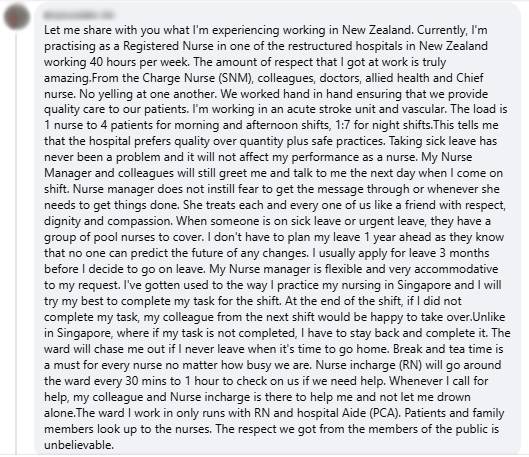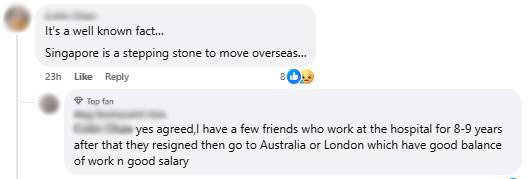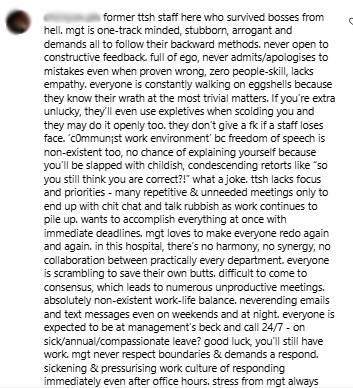SINGAPORE: Netizens believe that salary alone is not the issue, workplace toxicity plays a crucial role in why healthcare workers are leaving for jobs abroad.
Public healthcare nurses in Singapore earn salaries comparable to those in Australia and New Zealand after tax adjustments, Health Minister Ong Ye Kung stated in response to a parliamentary query.
On 26 February 2025, Workers’ Party MP for Hougang SMC, Dennis Tan Lip Fong, asked how local nurses’ salaries and working conditions compare to those in countries like Australia.
He also inquired whether wages and work conditions were key reasons for nurses leaving Singapore and what measures were in place to address these concerns.
In a written reply, Ong explained that after adjusting for tax differences, Singapore’s public healthcare nurses earn salaries similar to their counterparts in Australia and New Zealand, where income taxes are significantly higher.
To improve nurse retention, Ong highlighted ongoing government efforts, including the Award for Nurses’ Grace, Excellence and Loyalty (ANGEL) scheme introduced in 2024 and salary enhancements announced in January 2025.
He stated that these initiatives would further boost nurses’ total pay packages.
Ong also noted that those leaving Singapore tend to be foreign nurses who have worked in the country for several years, rather than local nurses.
He emphasised that reasons for departure are not solely based on salaries and that Singapore’s nurse attrition rate has returned to a single-digit level, which is considered normal for the sector.
Beyond nurses, 37,000 public healthcare workers—including allied health professionals, pharmacists, and administrative staff—can expect salary increases in 2025.
MOH stated that the adjustments aim to attract and retain talent, keeping pace with rising healthcare demands as the population ages.
The ministry is finalising details with other ministries and unions.
Meanwhile, 26,000 public sector nurses will receive smaller base salary increments to complement the ANGEL scheme.
Under the scheme, around 29,000 nurses will receive up to S$100,000 each over 20 years, ensuring financial stability and long-term commitment.
A Healthier Work Environment
While the government has focused on salary improvements, many nurses argue that work culture plays a bigger role in job satisfaction.
Comments under a Facebook post by The Online Citizen reflected widespread dissatisfaction with Singapore’s hospital work environment.
A registered nurse in a New Zealand hospital described a positive and respectful workplace, highlighting the collaborative atmosphere where doctors and nurse managers work without intimidation.
They noted that sick leave does not affect performance evaluations, and leave applications are typically submitted three months in advance rather than a year ahead.
Unlike in Singapore, where nurses often stay back to complete unfinished tasks, the next shift in New Zealand seamlessly takes over.
Breaks and tea times are mandatory, and senior nurses regularly check on staff to offer assistance. Patients and their families also show a high level of respect towards nurses.

Another nurse, who worked in Singapore for 10 years before moving to Auckland and later Australia, agreed that work-life balance in New Zealand and Australia is significantly better.

One user remarked that Singapore is widely seen as a stepping stone for nurses looking to move overseas.
Another agreed, sharing that they knew several colleagues who worked in Singapore hospitals for eight to nine years before resigning to seek better work-life balance and salaries in Australia or London.

Toxic Work Culture
One commenter noted that salary is not the main issue but rather the toxic work culture in hospitals, which needs urgent reform.
They criticised ministers for continuously deflecting from this core problem instead of addressing the real challenges faced by nurses.

Concerns over burnout and toxic work conditions in Singapore’s healthcare sector have been reignited following the sudden death of a 34-year-old healthcare worker at Tan Tock Seng Hospital (TTSH).
The worker, who had joined the profession through Singapore’s Professional Conversion Programme (PCP), reportedly collapsed in the operating theatre due to exhaustion. Reports indicate that she was granted three days of medical leave and later requested an extension due to continued illness. However, her request was denied, and she passed away shortly after returning to work.
Following her death, former TTSH employees came forward to share their experiences, describing a toxic work culture that has led to excessive stress and fatigue among staff.
One former employee criticised the hospital’s management as “one-track minded, stubborn, and arrogant,” alleging that leadership demanded compliance with outdated methods, dismissed constructive feedback, and lacked empathy.
Work-life balance was also reportedly poor, with staff expected to be available 24/7, including on weekends and during sick or compassionate leave.

Another ex-employee described their time at TTSH as “daily mental torture.”

A different former staff member highlighted the hospital’s strong hierarchical structure, where upper management held absolute authority.
They claimed that when employees attempted to voice concerns, their opinions were often dismissed or met with scrutiny.

The incident has sparked renewed debate on workplace conditions in Singapore’s healthcare system, with calls for urgent reforms to improve the well-being of nurses and other healthcare professionals.
The post Ong Ye Kung says nurses’ pay matches Australia, but netizens highlight toxic work environment appeared first on The Online Citizen.


